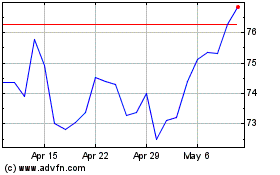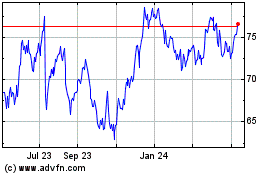Obama Begins Meeting With Wall Street Executives, To Push For Lending
December 14 2009 - 12:00PM
Dow Jones News
President Barack Obama began his meeting with top Wall Street
executives Monday, a session designed to remind banks of the
taxpayer assistance they received during the depths of the
financial crisis and talk about ways to boost lending to small
businesses.
Obama, in the middle of a fight over financial regulatory
reform, will also look for the bankers' support on the measure,
which many have lobbied forcefully to block.
The gathering in the Roosevelt Room was less crowded than
anticipated, with heavy fog in Washington keeping three of the
executives from attending in person. Lloyd Blankfein of Goldman
Sachs, John Mack of Morgan Stanley, and Dick Parsons of Citigroup
participated via video conference.
"Sorry your flight got held up," Obama told the three during a
brief photo opportunity.
One of the executives said it "certainly was not for lack of
effort" that they didn't make it to Washington.
The meeting is expected to clear the air between the president
and the financial sector amid increasing tension. Obama made his
frustration with Wall Street clear hours before the executives
arrived at the White House, telling CBS's 60 Minutes program that
he didn't seek office to help "a bunch of fat cat bankers."
"They're still puzzled why is it that people are mad at the
banks. Well, let's see," Obama said. "You guys are drawing down $10
[million], $20 million bonuses after America went through the worst
economic year that it's gone through in--in decades, and you guys
caused the problem. And we've got 10% unemployment."
Earlier Monday, Citigroup took steps to emerge from government
protection, saying it would repay $20 billion in aid and exit the
program through which the U.S. would cover billions of dollars in
loan losses. The Treasury Department said it will start unwinding
its 34% stake in Citigroup by selling up to $5 billion of its
common stock and the remainder over the next six to 12 months.
The meeting was attended by Blankfein of Goldman Sachs (GS); Ken
Chenault of American Express (AXP); Richard Davis of US Bancorp
(USB); Jamie Dimon of J.P. Morgan Chase (JPM); Richard Fairbank of
Capital One (COF); Bob Kelly of Bank of New York Mellon (BK); Ken
Lewis of Bank of America (BAC); Ron Logue of State Street Bank
(STT); Mack of Morgan Stanley (MS); Parsons of Citigroup (C); Jim
Rohr of PNC (PNC); and John Stumpf of Wells Fargo (WFC).
The administration was represented by White House adviser
Valerie Jarrett; Council of Economic Advisers Chair Christina
Romer; National Economic Council Director Larry Summers; and
Treasury Secretary Tim Geithner.
Summers said Sunday that Wall Street should recognize that "no
major bank would be intact" without the government's backstop.
"We were there for them," Summers said on ABC's This Week. "And
the banks need to do everything they can to be sure they're there
for customers across this country."
In a statement Monday, Dimon said J.P. Morgan Chase is doing its
part to support small businesses, boost lending, modify mortgages
for strapped homeowners, support regulatory reform and uphold sound
compensation practices.
"This is simply what a bank should do," Dimon said.
But the J.P. Morgan statement also said that the bank shares
"concerns" that some of the regulatory proposals could restrict
lending and hurt economic growth and job creation.
-By Henry J. Pulizzi, Dow Jones Newswires; 202-862-9256;
henry.pulizzi@dowjones.com
State Street (NYSE:STT)
Historical Stock Chart
From May 2024 to Jun 2024

State Street (NYSE:STT)
Historical Stock Chart
From Jun 2023 to Jun 2024
